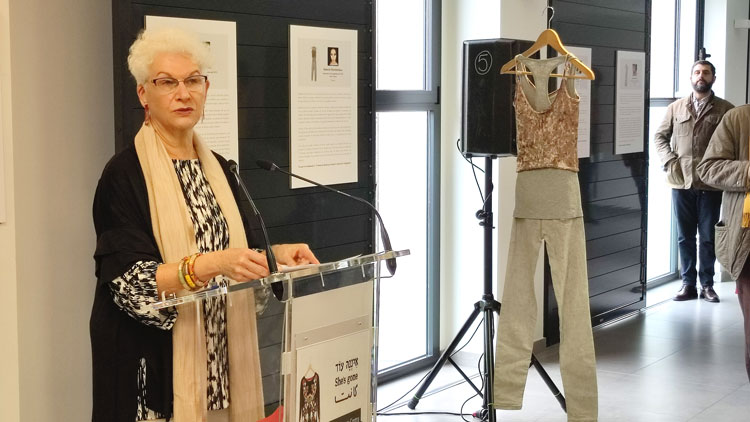Juan David Latorre
Yesterday, Tuesday, the Embassy of Israel presented the exhibition She’s Gone, an exhibition of protest art against gender violence, at the Espacio de Igualdad Carme Chacón of the Madrid City Council.
The event was attended by the ambassador of Israel, Rodica Radian-Gordon; the delegate of the Government Area of Social Policies, Family and Equality, José Fernández Sánchez, as well as the curator of the exhibition, Keren Goldstein.
The 25th of November marks the day of the fight against violence against women,” said the Israeli ambassador in her speech. This struggle is not only a gender struggle but a human rights struggle.”
Rodica Radian-Gordon went on to point out that “the phenomenon of violence against women and children within the family is, unfortunately, something that is present in all societies, that has been considered -and in many cases is still considered- one of the taboos that is not spoken about in public. So it took a lot of courage and a lot of wisdom to understand that this is not a “female condition”, but an abuse of power, in this case within the most intimate family, against the basic rights of women as human beings: an abuse of their opportunity to have a productive life with reasonable physical security, to be respected and to live in dignity”.
Specifically, on the featured installation the ambassador commented, “The She’s Gone installation has no expiry date. It was created in 2016 but it is more relevant than ever. The statistics of women murdered by their partners are still tremendous in Spain, in Israel and all over the world. And it is through artworks and installations like the current one that we try to pass on the message of urgency and the need to act, to look for all the previous signs, to educate about gender equality, human rights and to emphasise the obligation not to remain silent”.
The ambassador pointed out that the intention was to present She’s Gone in November 2020 or 2021. “We didn’t make it, because of the pandemic. We delayed it to October this year. But perhaps there are no coincidences in this world, and that is that today, when we finally present it, it is also exactly one month since the terrible day of 7 October when we experienced a barbaric and savage attack on our civilians by Hamas terrorists. 1,400 people were killed that day and more than 240 were kidnapped.”
Rodica Radian-Gordon noted that “there is a very important effort these days to investigate the war crimes committed by Hamas against women, children and the elderly on October 7. Specifically, she said, an effort is being made to gather and distribute authentic information, as well as to obtain expert evidence and prove that Hamas committed deliberate sexual crimes.”
She concluded her speech by stressing that “there is no doubt that a common thread runs between the recognition of gender-based violence as a crime and the recognition of systematic gender-based violence as a war crime and as a crime against humanity. Only in a more equal world will girls, women, and vulnerable individuals in general, be able to achieve such a basic right as the right to live in physical safety and dignity”. The ambassadors of Argentina, Uruguay, Monaco and Australia were present at the event.
The exhibition is an installation of garments that become silent testimony to meaningful lives, full of hope and dreams that were abruptly and violently taken away from them by their partners. Every year, 47,000 women and girls around the world are murdered by intimate partners or other family members. Some cases have never been solved.
The garments of 22 women murdered by their husbands or partners, belonging to various parts of the world, different religions, cultures and social classes, make up this installation, which carries in its folds the story of the pain, absence and orphanhood of their testimonies. Among them is, for the first time, the garment with which Ana Orantes made her testimony public on television, and which from now on will be added to the rest of the garments in the installation as another plea against gender violence.
The curator Keren Goldstein is an Israeli activist and documentary filmmaker who actively collaborates with public and private institutions, working on projects to raise awareness of gender violence. She told The Diplomat that “in Israel there are an average of 20-25 victims a year as a result of gender-based violence, 40% of whom are Arab women. We have to educate our sons and daughters how to manage their anger, their rage and how to answer the question: ‘What are you doing? For more information on the exhibition, click here.









